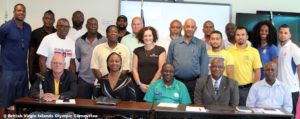
Participants from 14 countries at the Caribbean Association of National Olympic Committee (CANOC) Caribbean Coaching Certification Program (CCCP) Training of Trainers Workshop in the British Virgin Islands. Photo: BVIOC
The British Virgin Islands Olympic Committee (BVIOC) in collaboration with the Caribbean Association of National Olympic Committees (CANOC) Academy hosted a Caribbean Coaching Certification Program (CCCP) – Training of Trainers’ Workshop – in Tortola, BVI, from October 13 – 15, 2016.
The two-day course, conducted by Mr. Dave Farmer, Regional Coordinator and Director of the Barbados Olympic Academy had a regional reach targeting coaches from all disciplines and all affiliates to the NOC and potential sport leaders with the purpose of broadening and strengthening the national adoption of the sport for all concept and building the capacity of a nation.
A total of 17 participants from 15 Caribbean countries attended the workshop. The individuals were affirmed by their NOCs as being sport instructors who are primarily engaged in coaching and training of a broad audience and who are committed to furthering LTAD programmes within their communities.
“The goal of the workshop is for participants to take what they learn here and share it at a grass roots level with those in the community who would otherwise not get exposure to more formal training and to pass on the basics of, and best practices in coaching and sporting principles,” said Farmer.
“We were excited when the BVIOC was accepted to be the co-host of this workshop,” said Ephraim Penn, President of the BVIOC. “Our focus over the last couple of years has been on building the capacity of sports in the territory. The CCCP initiative advances the movement of the popular LTAD series of seminars that the BVIOC is running to guide and train not only Physical Education teachers and sports federations but also those working as volunteers, institutional care givers and managers in the Virgin Islands.”
“The CCCP Training of Trainers’ Workshop is run with the expectation that each participant will commit to working with their National Olympic Committees and sports organizations in the development and broadening of an understanding of the fundamental of coaching within their respective countries,” explained Mr. Keith Joseph, Secretary of CANOC.
The target audience to benefit from such training by the workshop participants includes all those involved with athletes in the capacity of parent, volunteer, untrained PE Teachers who either are directly involved with coaching a sport or working in an administrative capacity. Persons who then demonstrate further interest can then go on to obtain the various levels of certification that would be required by the different sports.
The participants from Anguilla, Antigua, Aruba, Barbados, Bahamas, British Virgin Islands, Cayman Islands, Dominica, Grenada, Guyana, Guadeloupe, Haiti, St. Vincent and the Grenadines, Trinidad and Tobago, and Suriname received their Training of Trainers certificates at the end of the workshop.
They are expected to work with their respective NOCs to coordinate the first Coaching Theory Course (CTC) and the Caribbean Community Sport Leaders Course (CCSLC) within 3 to 6 month of completing the programme.
The workshop was held under the agreement between CANOC and the Peruvian Olympic Committee and the Lima 2019 Organizing Committee.
In her opening remarks, Acting Director of the Department of Youth Affairs and Sports (DYAS), Mrs. Brenda Lettsome-Tye recognised the importance of the workshop as it ties in with the Government’s objective of a National Sports Policy of making training a priority and its commitment to forging its partnership with the BVIOC and to developing a culture of excellence of sport in the Virgin Islands.
About the Caribbean Coaching Certification Program
The CCCP program has been in existence since 1998, and within this time over 1,000 persons in the Caribbean have completed the Coaching Theory Course (CTC) and the Caribbean Community Sport Leaders Course (CCSLC).
The CTC course is designed to equip the Coach and Sport Leader with a strong theoretical base to accompany his or her practical skills. The CCCP courses have been widely accepted across all the territories of the Caribbean and serve to improve the overall abilities of the Caribbean coaching base.
A new module for coaches of persons with disabilities has been introduced for an inclusive approach to sport and coaches should be exposed to and trained in the techniques associated with coaching all athletes.